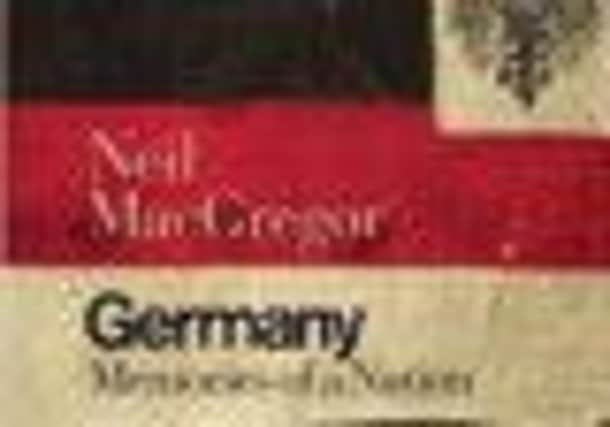Book review: Germany: Memories of a Nation


Germany: Memories of a Nation
Neil MacGregor
Allen Lane, £30
What fascinates MacGregor and bestows a zealous sense of mission on his project is the diversity of German culture. His definition encompasses the Kulturnation (cultural nation) which long precedes the first formal German unification of 1871, beginning with the founding of a German-speaking university in Prague in the 14th century.
A pedant might complain that this omits the distant but imaginatively formative uprising of Germanic tribes against the Romans 2,000 years ago (revisited by Anselm Kiefer in his current magisterial exhibition at the Royal Academy in London).
CONNECT WITH THE SCOTSMAN
Advertisement
Hide Ad• Subscribe to our daily newsletter (requires registration) and get the latest news, sport and business headlines delivered to your inbox every morning
The format of viewing a nation through objects has its limitations but MacGregor’s selectivity is generally judicious. He brings the story of pre-Reformation Germany quite brilliantly to life, for example, not through yet another glowering Luther portrait, but through an exquisite sculpture by Tilman Riemenschneider, a sculptor little known outside Germany but, he believes, “comparable to Donatello in the intensity and subtlety with which he explores the spiritual”.
The difficulty of a project of this scale is how to deal with the ebb and flow of history as well as the moments with precise dates and artworks conveniently attached. Some explanations are boiled down so far as to remove much sense. The Holy Roman Empire, the author says, satisfied Protestant and Catholic aspirations and, despite Voltaire’s pithy one-liner about it being none of the three things it was declared to be, “was emphatically all three”. Well, only up to a point. Goethe has his students in the beer cellar scene in Faust mock the fissiparous nature of the late-period “empire”: “The dear old Roman kingdom: how is it still holding together?”
Individual figures are better material. The ambitious era of Bismarck is encapsulated in the image of the founder of modern Germany as a blacksmith hammering out the borders of the late 19th-century Reich with blood and iron. If the imagery of the great man is powerful, MacGregor also points to the undertow of brutality in Bismarck’s own memoirs. The “general reorganisation of Germany”, the Iron Chancellor recalled, could only be achieved by means of crisis and war against Austria and France. If readers will be most familiar with the desecrations of the Third Reich, the story of Franz Ehrlich, the artist incarcerated in Buchenwald and required to carve the dreadful inscription “To each his deserts” on the gate, but doing so in the, modern typography of the Bauhaus – one of the movements declared “degenerate” – is a shrewd example of the selective curatorial eye, telling us many stories in a single exhibit.
Without doubt the weakest point, as in the exhibition, is East Germany. In a story arranged around cultural objects, it seems odd to miss out pretty much the entirety of the GDR (40 years from 1949-89) or indeed the post-unification generation of artists, such as the fashionable socialist-realism pastiches of Neo Rauch.
The book relies heavily on an account of Ernst Barlach’s flying angel in Güstrow Cathedral to represent art in the East but we do not learn much about the declining phase of communist Germany, other than the startlingly obvious fact that a lot of people wanted to get out of it. As we move to the present, some chapters read like an A-level teacher in a hurry, tidying away the contentious parts of history. No nation, MacGregor reminds us, has done more to confront its past – but then not many nations, with the exception of barely democratic Russia and undemocratic China, have quite so much to confront.
Advertisement
Hide AdBeing a Germanophile of more awkward temperament, I find the reverential tone towards today’s Federal Republic a tad officious – it depends how much you enjoy quotes from culture ministers. But the author’s commitment and passion for Germany conquer most quibbles. Nevertheless, through both the book and the radio series, MacGregor has shone a light on the many Germanies that make up the one we know today.